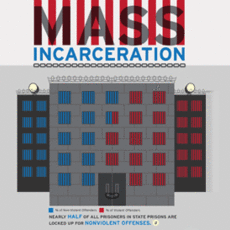
Has North Carolina taken one step forward but another one back in trying to solve the state's prison population issues? The recently passed Justice Reinvestment Act looks to make some positive strides in the area of criminal justice reform, particularly by providing alternatives to prison for many drug possession offenses. But another new law that stiffens habitual offender laws is disturbingly reminiscent of other states' tough habitual offender laws — such as California's infamous "three strikes" law that, rather than reducing recidivism, has led to a well-publicized overcrowding problem in that state's prisons.
America is the world's largest incarcerator, but our addiction to incarceration is doing little to make Americans safer. Especially in the face of economic crisis, our government should invest in alternatives to incarceration and make prisons options of last — not first — resort. As the recent decision in Brown v. Plata underscores, now is the time for states to be reducing their prison populations. North Carolina and other states would do well to re-evaluate their habitual offender laws with an eye toward implementing more effective ways to deter crime without the high social price tag that has plagued our system for so long.
Check out this opinion piece by the ACLU of North Carolina's Sarah Preston at the News & Observer to learn more, and go here to read more about the ACLU's work to combat mass incarceration.
Learn more about overincarceration: Sign up for breaking news alerts, follow us on Twitter, and like us on Facebook.

